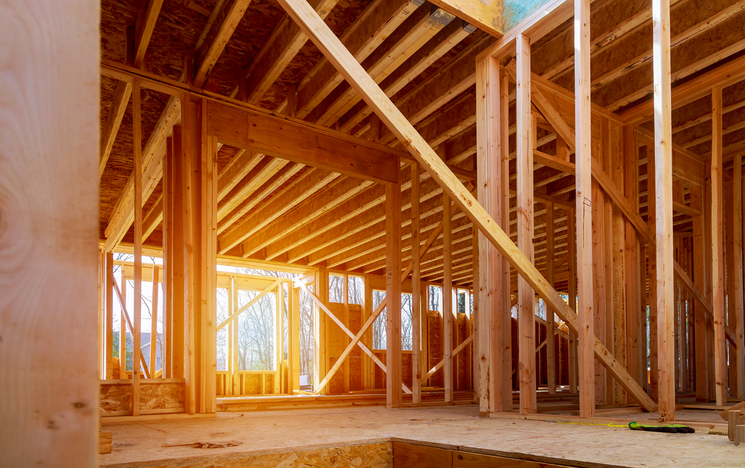Keeping Housing Affordable: The Status of Building Codes in NC

Interior view of a house under construction home framing
Over the course of the past two years, the building experts at the NC Building Code Council, an appointed council charged with establishing codes and standards for the built environment in the state, have been weighing potential updates to North Carolina’s energy, fuel, and mechanical building codes. The council, staffed by the NC Commissioner of Insurance, oversees updates to energy codes every six years (previously updated every three years prior to the passage of House Bill 120 in 2013) as a means to ensuring homes and structures are safe, durable, and affordable to own. As part of this most recent code cycle, the council has specifically been weighing updates to the energy conservation code, which establishes the minimum energy efficiency standards for homes.
Part of the reason this code cycle is particularly important is the fact that North Carolina is still essentially operating within the construct of residential energy codes that date back to 2009, with very modest revisions. Outdated codes mean newly constructed homes cost more for the homeowners to operate, are less resilient in the face of storms, and have poorer indoor air quality than homes built to modern standards found in many other states.
What are the benefits of an updated energy conservation code?
According to the U.S. Department of Energy, new homes built to the 2021 International Energy Conservation Code (IECC) standard would provide $6,223 of net life-cycle cost savings to the homeowner. While these updated codes would come with an additional $4,000-6,000 in upfront costs, they would still lead to an overall net savings, along with immediate savings to the homeowner. Those immediate savings include $345 less in annual utility bills, and an overall reduction in energy costs by 16.3%. Given the significant energy savings to the homeowner, it’s expected that the upfront costs would be recuperated within less than four years. When buyers use a 30-year mortgage, the energy cost savings very likely will be more than the incremental mortgage cost, making the home buyer cash positive from day one.
Opposition to homeowner energy savings.
While the benefits to updated energy codes speak for themselves, we’ve still seen efforts to halt the Building Code Council’s efforts to move forward with the 2021 IECC codes. Earlier this legislative session, Representative Brody introduced House Bill 488 ‘Code Council Reorg. And Var. Code Amend,’ which seeks to prohibit the NC Building Code Council from considering and updating rules to amend the energy conservation residential code until 2026, which in effect, would prevent updated code from going into place until 2031, at the earliest. This prohibition would maintain the current 2009 energy code standards through at least 2031, leaving North Carolina’s homeowners and renters with codes that would be two decades outdated, resulting in higher utility bills. This is especially concerning in light of the fact that Duke Energy Carolinas is advocating for a combined nearly 30% increase in utility rates over the coming couple of years.
Latest Status of House Bill 488 and updated energy codes.
The legislature passed HB 488 at the end of June. Then a little bit over a week later, the bill was vetoed by Governor Cooper due to concerns that it would lead to higher utility costs for homeowners and renters in the state. Governor Cooper commented on the veto by saying “this bill stops important work to make home construction safer from disaster and more energy efficient, and ultimately will cost homeowners and renters more money. The bill also imperils North Carolina’s ability to qualify for FEMA funds by freezing residential building code standards. Not only does the bill wipe out years of work to make homes safer and more affordable, it also violates the Constitution by rigging the way rules are made.”
While this veto is a strong signal to the voters of North Carolina and the legislature, the work is not done to ensure the state still has an opportunity to update energy codes. In fact, the NC House has placed the bill on the schedule for a veto override in the very near future. A veto override requires a vote of three-fifths of legislators present and voting, which may impact the actual vote date. With a veto override, the legislature can force the passage of HB488 and ultimately stall energy conservation code updates in North Carolina until at least 2026, if not 2031.
What can you do?
Now is an important time to reach out to your state elected officials asking them to protect homeowners and ratepayers in North Carolina by allowing the Building Code Council to continue to carry out their work. Reach out to your legislators today asking that they vote to sustain Governor Cooper’s veto. Millions of dollars of Federal Emergency Management Agency (FEMA) grant funds are potentially on the line should the legislature vote to move forward, along with significantly higher energy costs for new homeowners in the state.
Now is your chance to help keep homes affordable, while reducing emissions in the built environment. Reach out to your state representative today!

